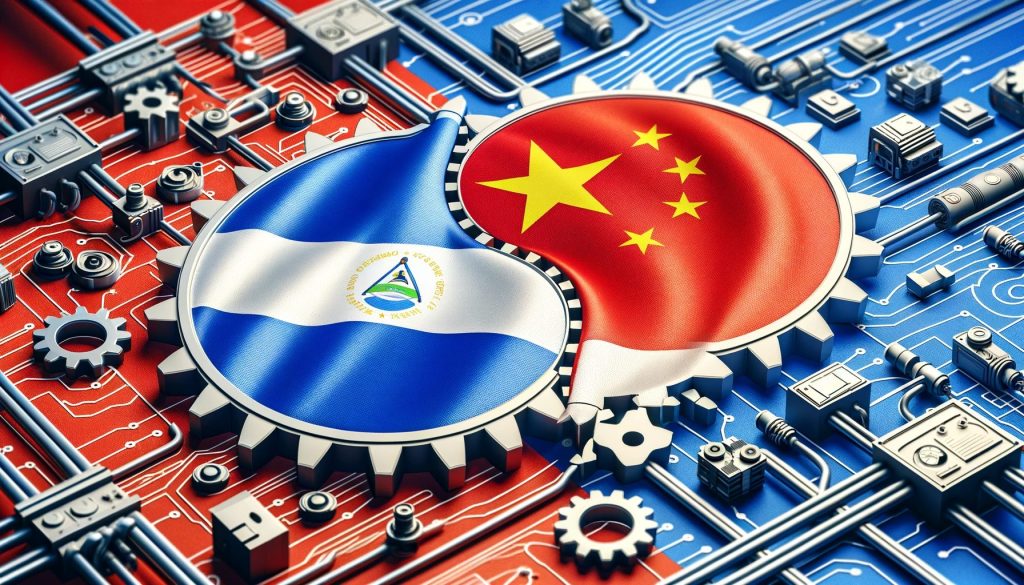
Nos últimos anos, a relação entre a Nicarágua e a China tem se intensificado, marcando uma era de investimentos significativos e uma influência crescente da nação asiática no país centro-americano. Esta parceria estratégica abrange diversos setores, desde infraestrutura até tecnologia, e tem implicações geopolíticas e econômicas que merecem uma análise detalhada.
Um dos projetos mais ambiciosos e discutidos é o plano de construção de um canal interoceânico na Nicarágua, financiado por capitais chineses. Apesar dos desafios e das críticas relacionadas aos impactos ambientais e sociais, este projeto, liderado pela empresa chinesa HKND Group, promete transformar significativamente a economia e a infraestrutura do país. Além disso, ele representa um ponto de interesse estratégico para a China, posicionando-a como uma concorrente direta do Canal do Panamá e ampliando sua influência na região (Fonte: BBC News).
No campo tecnológico, a presença chinesa também é notável. A Huawei, gigante tecnológica chinesa, tem desempenhado um papel fundamental na modernização das infraestruturas de telecomunicações da Nicarágua. Esta colaboração não só melhora a conectividade e os serviços de telecomunicações no país, mas também fortalece os laços entre as duas nações, inserindo a Nicarágua na esfera de influência digital da China (Fonte: Nikkei Asia).
Além disso, a China tem se tornado um parceiro comercial cada vez mais importante para a Nicarágua. Produtos nicaraguenses, especialmente carnes e outros produtos agrícolas, têm encontrado na China um mercado em expansão, o que tem sido fundamental para a economia da Nicarágua, especialmente em tempos de incertezas econômicas globais. Em troca, produtos manufaturados e tecnológicos chineses têm preenchido o mercado nicaraguense, alterando a dinâmica comercial e a dependência de mercados tradicionais (Fonte: Global Times).
No entanto, esta crescente influência também gera debates e preocupações. Críticos apontam para os potenciais riscos associados à dependência econômica e política em relação à China, além das preocupações com questões ambientais e de direitos humanos. A opacidade em torno de alguns acordos e projetos também suscita dúvidas sobre a transparência e os benefícios reais para a população nicaraguense (Fonte: Reuters).
Em meio a essas considerações, é inegável que a parceria entre a Nicarágua e a China tem remodelado o cenário econômico e geopolítico do país. Enquanto a Nicarágua se beneficia dos investimentos em infraestrutura, tecnologia e aumento do comércio, a China consolida sua presença e influência na América Latina, um movimento que reflete suas ambições globais e a dinâmica de poder em constante mudança no cenário mundial.
Para um entendimento aprofundado das implicações dessa parceria, é fundamental acompanhar os desenvolvimentos futuros, avaliando tanto os avanços quanto os desafios. A relação entre a Nicarágua e a China é um exemplo claro de como as dinâmicas globais estão redefinindo as alianças internacionais, trazendo oportunidades e desafios para os países envolvidos.
Pós-Doutor em Competitividade Territorial e Indústrias Criativas, pelo Dinâmia – Centro de Estudos da Mudança Socioeconómica, do Instituto Superior de Ciencias do Trabalho e da Empresa (ISCTE, Lisboa, Portugal). Doutor em Relações Internacionais pela Universidade de Brasília (2007). É Diretor Executivo do Mapa Mundi. ORCID https://orcid.org/0000-0003-1484-395X
